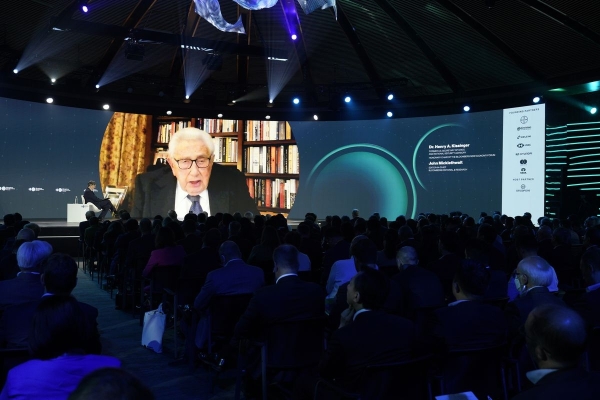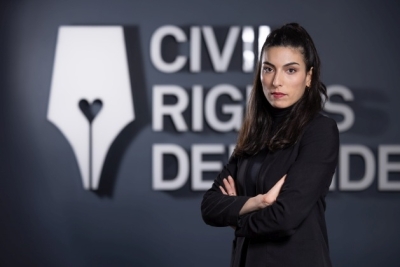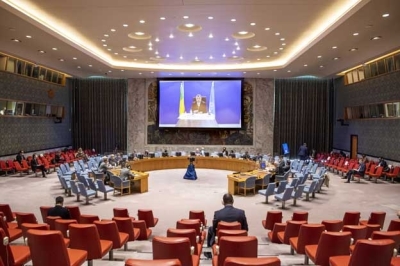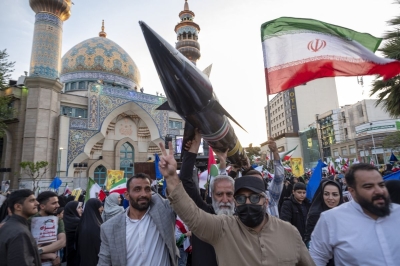I was sitting on the mezzanine of the Yale Club’s ballroom in midtown Manhattan as a sea of men in dark suits and women in bright dresses stood up from their white-draped tables while a cake was brought out.
“Happy Birthday, dear Henry,” they sang, and the man a few days shy of his 100th birthday blew out the candles, then raised his two arms with a Richard Nixon-like flourish.
This was Henry Kissinger’s birthday celebration at the Economic Club of New York, one of the city’s most elite organizations. He had been introduced by the chief executive officer of the New York Fed. Here everyone was, gathered to celebrate Kissinger and what he represents.
Kissinger’s legacy as a Cold War strategist, influential adviser to Presidents Richard Nixon and Gerald Ford, and jet-setting diplomatic shuttler has persisted even though he’s now been out of office much longer than in government and has outlived his peers. Despite his record for perpetuating atrocities around the world, he’s still called upon for counsel as to how the war in Ukraine will end or how to avert conflict with China.
During the Nixon administration, Kissinger opened relations with China and helped broker arms control agreements with the Soviet Union. But he also prolonged the Vietnam War and extended the conflict into Laos and Cambodia. As many as 150,000 Cambodian civilians were killed, more than were previously known, when Kissinger ordered the carpet bombing of the country from 1969 onward, as the Intercept’s Nick Turse reports. Kissinger backed leaders in Pakistan and Indonesia as each killed 200,000 people in neighboring territories, embraced Argentina’s military as it disappeared tens of thousands, and supported Gen. Pinochet’s military overthrow in Chile.
Much has been written about his record. Yet three aspects of his legacy — the centralization of foreign policymaking power in the White House, the avoidance of ever apologizing for his destructive actions, and the corporatization of foreign policy — have been less covered. But they capture how America works as a superpower in 2023.
For those reporting on foreign policy, and especially in New York, one is always in Kissinger’s shadow. Even as scholars, journalists, and progressives make a credible case that he committed war crimes (an accusation he has rejected), Kissinger retains many admirers for his realpolitik prowess during the Cold War tensions; new books about his ingenuity as a statesman keep coming out; and he is still writing books, too. On the subway to the event, I saw a young man in shorts and a hoodie reading Kissinger’s new hardcover Leadership. I happened to stumble upon a tiny, 1950s-style shoe store blocks away from the Yale Club, with a picture of Kissinger and its owner on the wall.
He still attends marquee international conferences like Davos and Bilderberg. Kissinger’s assistant told me that he has a tough time keeping up with his boss, even at 100.
Kissinger spoke for an hour at the Economic Club as he slowly and carefully waded into Russia’s war, China’s rise, and the shape of US foreign policy. He has always been circumspect and extremely careful with his words. He stood by everything he had done in his long career.
“My view is, we need to be always strong enough to resist any pressures. We must always be ready to defend what we define as our vital interests. We must also be clear about what our vital interests are and stay within those bounds,” he said.
Kissinger centralized foreign policy power in the White House
Kissinger made an important observation at the Economic Club. “In almost every administration, in foreign policy, the most sensitive tasks are given to the security adviser and not the secretary of state,” he said.
That’s a development that he helped advance, building on the track record of President John F. Kennedy’s national security adviser McGeorge Bundy, who also began to concentrate new powers within the White House.
Thanks to Kissinger, the national security adviser remains the “most important element of performing foreign policy,” as he put it. “You learn how to manage bureaucracy; you don’t learn to ask where you should be going.”
Kissinger eventually consolidated the job of national security adviser and the nation’s top diplomat, serving in the White House and as secretary of state at once. While that exact dual-hatted official hasn’t existed since, that concentration of foreign policymaking among the president’s staff, and away from the State Department, has endured in Democratic and Republican administrations.
He also built out the National Security Council, then just three decades old, expanding the president’s advisory apparatus. In the 1974 biography Kissinger, Marvin Kalb and Bernard Kalb called it “Henry’s wonderful machine” and emphasized how he worked to “centralize foreign policy in the White House and to dismiss or silence dissenters within the bureaucracy — including the Secretaries of State and Defense ...” At first, William Rogers, who served as Nixon’s secretary of state from 1969 to 1973, “made no fuss and later, when he did, it was too late,” they write.
That’s a lesson that Tony Blinken, Biden’s longtime aide and the current secretary of state, has recognized. He reflected on his time both as an adviser to the Obama White House and then as deputy secretary of state during that administration in a think tank paper from 2017. “The State Department needs to lean in and put ideas forward. When you lean back, no one in the White House will wait around,” Blinken said.
The national security adviser, who is not subject to Senate confirmation and is often across the hall from the president, has become indispensable for foreign policymaking. Not just as an arbiter of options or an honest broker among secretaries of departments and generals, but in effect as a policymaker.
“Kissinger started that model,” says Jeremy Shapiro, who worked in the State Department during the Obama administration and is now research director at the European Council on Foreign Relations. “Every administration since Kissinger has been the most White House-centric ever.”
Kissinger never apologized for overseas actions, and few US leaders do to this day
In 2001, firebrand author Christopher Hitchens made the case in The Trial of Henry Kissinger that Kissinger was liable for war crimes. At the time, Kissinger sought assurances before doing media interviews that the book would not be raised. He still rarely answers reporters’ questions about the Vietnam War.
To conclude an extraordinary conversation, Dr. Henry Kissinger blows out the candles on his 100th birthday cake on the Economic Club of New York stage. Thank you to all who attended and tuned in, the Club is honored to have hosted such a special celebration.
— The Economic Club of New York (@EconClubNY) May 23, 2023
_#ECNYKissinger pic.twitter.com/KBOIV83OVr
Kissinger has been the original “don’t apologize and just tweet through it.” It’s part of how Reagan, Bush, and Trump have persevered and survived — Kissinger modeled that you can play foreign policy like chess and not have to answer domestically for the disastrous consequences in other countries. And it’s had a major impact on the way leaders subsequently have conducted themselves internationally. “The methods employed by Nixon and Kissinger to circumvent democratic scrutiny of foreign policy have since become standard; they were deployed recently to discredit critics of and spread disinformation about the invasion of Iraq,” historian Greg Grandin has written.
“He’s never apologized,” Carolyn Eisenberg, a professor of history at Hofstra University, told me. And this says as much about the foreign policy establishment as Kissinger himself. “It’s taking place in a context where the damage of these policies has not really been acknowledged — the killing of huge amounts of people in Laos, and Cambodia, and the list goes on.”
As Eisenberg said, “The fact that Kissinger’s kind of immune from criticism is a consequence of that larger failure.”
This is an ongoing feature of America at war. Twenty years after the disastrous and misguided US invasion of Iraq, former President George W. Bush has fashioned himself into an elder statesman and rarely faces tough questions on the war. A 2022 gaffe was particularly revealing. Bush described the “decision of one man to launch a wholly unjustified and brutal invasion of Iraq,” and then he laughed and corrected himself to say Ukraine, as he was referring to Russian President Vladimir Putin’s war. But there has not been true accountability for the former US president and his inner circle for launching the invasion of Iraq and other post-9/11 wars that continue to this day.
Or take the civilian toll of the US’s air wars across the Middle East. Some (but not all) administrations have worked to minimize civilian casualties, and the Pentagon has a review process to investigate reported civilian casualties. But that process — one of the few accountability measures in places — is deeply insufficient, marred by “a pattern of impunity,” a New York Times investigation found.
That pattern included failures “to detect civilians, to investigate on the ground, to identify causes and lessons learned, to discipline anyone or find wrongdoing that would prevent these recurring problems from happening again,” wrote Azmat Khan. “It was a system that seemed to function almost by design to not only mask the true toll of American airstrikes but also legitimize their expanded use.”
At a Kennedy Library conference in 2006 on Vietnam, anchor Brian Williams moderated a panel with Kissinger and asked him, “Is there anything you would like to apologize for?” Eisenberg recounts this scene in the epilogue of her new book, Fire and Rain: Nixon, Kissinger, and the Wars in Southeast Asia.
Kissinger called the question “highly inappropriate.”
“We have to start with the assumption that serious people were making serious decisions with the national interest and world interest at heart,” he said.
At the Economic Club, Kissinger did not take any questions from the media.
Kissinger corporatized US foreign policy
Another dynamic on display at the Economic Club’s celebration was that Kissinger, throughout his career, has connected the business community to the foreign policy elite in government.
It’s an underreported part of his legacy: The Economic Club’s hosts did not mention his commercial work in Kissinger’s extensive bio at the birthday party, but it has defined generations of US foreign policy as he pioneered a new way to travel through the revolving door.
In 1982, he launched Kissinger Associates. He hired some of his most powerful colleagues from the national security state, and they sought to keep their client list secret, even when Congress pushed to know. Reporter James Mann has emphasized that Kissinger’s firm distinguished itself by the large size of its retainer, about $250,000, or about $785,000 in today’s dollars.
Journalists later uncovered that the firm advised major banks, multinational corporations, and financial institutions, among them American Express, Anheuser-Busch, Coca-Cola, Heinz, Fiat, Volvo, Ericsson, and Daewoo. “For example, one client, the ITT Corporation, a $9 billion corporation with about 7 percent of its annual business in military contracts, operates various United States missile systems under a $700 million contract, according to the company’s annual reports,” the Times reported.
Kissinger also served as a conduit between big business and China.
When he launched the firm four decades ago, journalists raised many of the same questions that I think about today. Is it ethical for a former senior official to continue to serve on federal advisory boards that give policy recommendations to the Pentagon, the State Department, or the president while also advising companies that are likely to profit from those geopolitical decisions?
Kissinger helped normalize this dynamic of being a consultant to big business and a public policy voice.
His successors have followed this trend. Brent Scowcroft worked as vice chair of Kissinger Associates prior to joining the George H.W. Bush administration as national security adviser and later started his own firm. Former Secretary of State Madeleine Albright, former Secretary of Defense William Cohen, and national security adviser Sandy Berger, after serving in the Clinton administration, each launched their own consultancies. Former Bush Cabinet officials Condoleezza Rice and Robert Gates started a firm together. And Blinken banded together with national security leaders from the Obama administration in 2017 to establish WestExec Advisors to counsel tech companies, finance, and military contractors, before joining the Biden administration.
Kissinger’s nondisclosure of clients has become the norm and set the tone across this entire network of consulting firms, which tend to only publicly reveal clients as legally required, such as when their employees go into government.
“A big part of Henry Kissinger’s legacy is the corruption of American foreign policymaking,” says Matt Duss, who previously worked for Sen. Bernie Sanders and is now a fellow at the Carnegie Endowment for International Peace. “It is blurring the line, if not outright erasing the line, between the making of foreign policy and corporate interests.”
Kissinger’s firm has never had a website. Reporters stopped asking as many questions over the years of his work and his clients.
Kissinger still sits on the Defense Policy Board that advises Pentagon leadership, and his current client list remains a closely held secret. As his former colleague Les Gelb put it in the New York Times Magazine in 1986, “Kissinger Means Business.”






